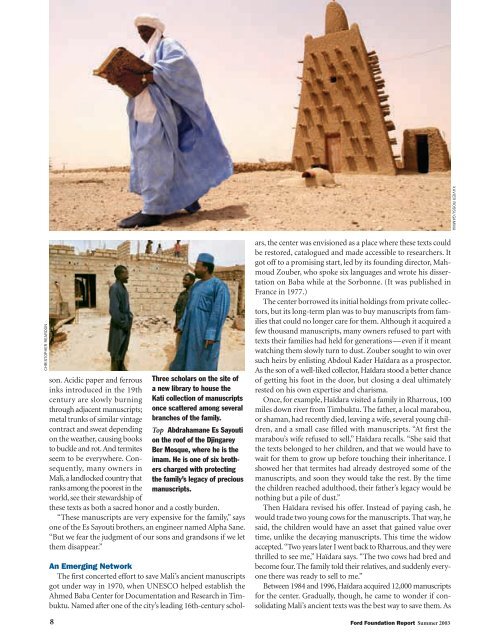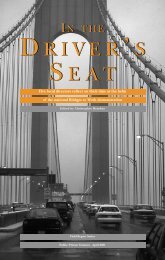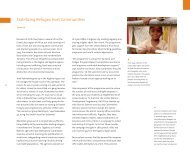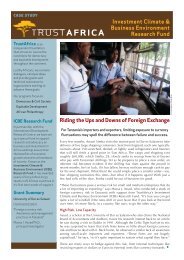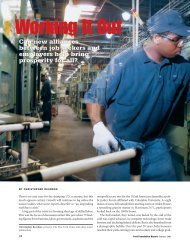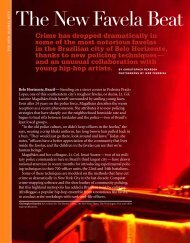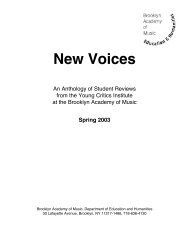Secrets of the Sahara - christopher reardon
Secrets of the Sahara - christopher reardon
Secrets of the Sahara - christopher reardon
Create successful ePaper yourself
Turn your PDF publications into a flip-book with our unique Google optimized e-Paper software.
XAVIER ROSSI/GAMMA<br />
CHRISTOPHER REARDON<br />
son. Acidic paper and ferrous<br />
inks introduced in <strong>the</strong> 19th<br />
century are slowly burning<br />
through adjacent manuscripts;<br />
metal trunks <strong>of</strong> similar vintage<br />
contract and sweat depending<br />
on <strong>the</strong> wea<strong>the</strong>r, causing books<br />
to buckle and rot. And termites<br />
seem to be everywhere. Consequently,<br />
many owners in<br />
Mali, a landlocked country that<br />
ranks among <strong>the</strong> poorest in <strong>the</strong><br />
world, see <strong>the</strong>ir stewardship <strong>of</strong><br />
Three scholars on <strong>the</strong> site <strong>of</strong><br />
a new library to house <strong>the</strong><br />
Kati collection <strong>of</strong> manuscripts<br />
once scattered among several<br />
branches <strong>of</strong> <strong>the</strong> family.<br />
Top Abdrahamane Es Sayouti<br />
on <strong>the</strong> ro<strong>of</strong> <strong>of</strong> <strong>the</strong> Djingarey<br />
Ber Mosque, where he is <strong>the</strong><br />
imam. He is one <strong>of</strong> six bro<strong>the</strong>rs<br />
charged with protecting<br />
<strong>the</strong> family’s legacy <strong>of</strong> precious<br />
manuscripts.<br />
<strong>the</strong>se texts as both a sacred honor and a costly burden.<br />
“These manuscripts are very expensive for <strong>the</strong> family,” says<br />
one <strong>of</strong> <strong>the</strong> Es Sayouti bro<strong>the</strong>rs, an engineer named Alpha Sane.<br />
“But we fear <strong>the</strong> judgment <strong>of</strong> our sons and grandsons if we let<br />
<strong>the</strong>m disappear.”<br />
An Emerging Network<br />
The first concerted effort to save Mali’s ancient manuscripts<br />
got under way in 1970, when UNESCO helped establish <strong>the</strong><br />
Ahmed Baba Center for Documentation and Research in Timbuktu.<br />
Named after one <strong>of</strong> <strong>the</strong> city’s leading 16th-century scholars,<br />
<strong>the</strong> center was envisioned as a place where <strong>the</strong>se texts could<br />
be restored, catalogued and made accessible to researchers. It<br />
got <strong>of</strong>f to a promising start, led by its founding director, Mahmoud<br />
Zouber, who spoke six languages and wrote his dissertation<br />
on Baba while at <strong>the</strong> Sorbonne. (It was published in<br />
France in 1977.)<br />
The center borrowed its initial holdings from private collectors,<br />
but its long-term plan was to buy manuscripts from families<br />
that could no longer care for <strong>the</strong>m. Although it acquired a<br />
few thousand manuscripts, many owners refused to part with<br />
texts <strong>the</strong>ir families had held for generations—even if it meant<br />
watching <strong>the</strong>m slowly turn to dust. Zouber sought to win over<br />
such heirs by enlisting Abdoul Kader Haïdara as a prospector.<br />
As <strong>the</strong> son <strong>of</strong> a well-liked collector, Haïdara stood a better chance<br />
<strong>of</strong> getting his foot in <strong>the</strong> door, but closing a deal ultimately<br />
rested on his own expertise and charisma.<br />
Once, for example, Haïdara visited a family in Rharrous, 100<br />
miles down river from Timbuktu. The fa<strong>the</strong>r, a local marabou,<br />
or shaman, had recently died, leaving a wife, several young children,<br />
and a small case filled with manuscripts. “At first <strong>the</strong><br />
marabou’s wife refused to sell,” Haïdara recalls. “She said that<br />
<strong>the</strong> texts belonged to her children, and that we would have to<br />
wait for <strong>the</strong>m to grow up before touching <strong>the</strong>ir inheritance. I<br />
showed her that termites had already destroyed some <strong>of</strong> <strong>the</strong><br />
manuscripts, and soon <strong>the</strong>y would take <strong>the</strong> rest. By <strong>the</strong> time<br />
<strong>the</strong> children reached adulthood, <strong>the</strong>ir fa<strong>the</strong>r’s legacy would be<br />
nothing but a pile <strong>of</strong> dust.”<br />
Then Haïdara revised his <strong>of</strong>fer. Instead <strong>of</strong> paying cash, he<br />
would trade two young cows for <strong>the</strong> manuscripts. That way, he<br />
said, <strong>the</strong> children would have an asset that gained value over<br />
time, unlike <strong>the</strong> decaying manuscripts. This time <strong>the</strong> widow<br />
accepted. “Two years later I went back to Rharrous, and <strong>the</strong>y were<br />
thrilled to see me,” Haïdara says. “The two cows had bred and<br />
become four. The family told <strong>the</strong>ir relatives, and suddenly everyone<br />
<strong>the</strong>re was ready to sell to me.”<br />
Between 1984 and 1996, Haïdara acquired 12,000 manuscripts<br />
for <strong>the</strong> center. Gradually, though, he came to wonder if consolidating<br />
Mali’s ancient texts was <strong>the</strong> best way to save <strong>the</strong>m. As<br />
8 Ford Foundation Report Summer 2003


